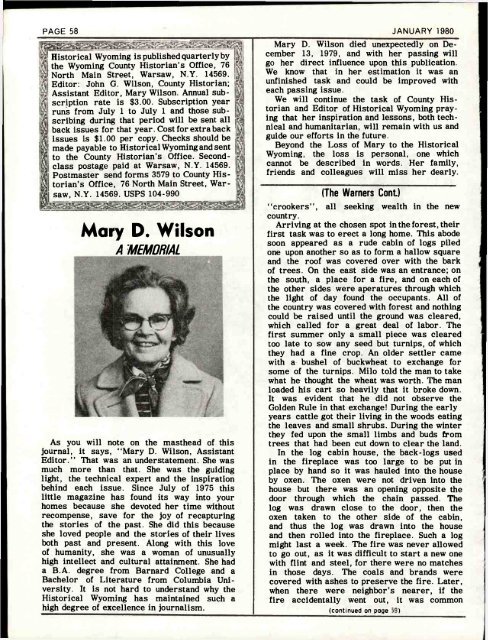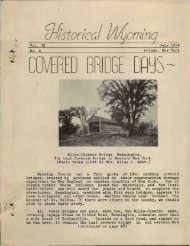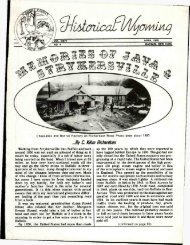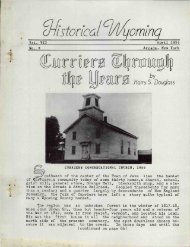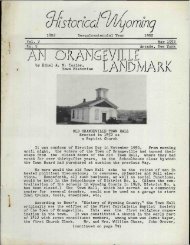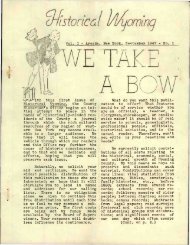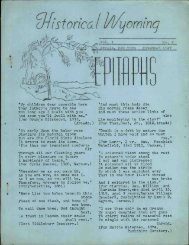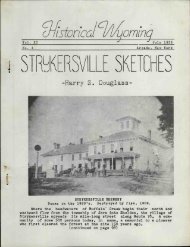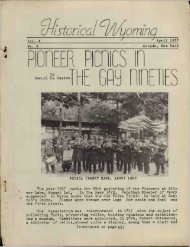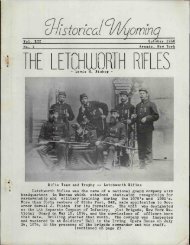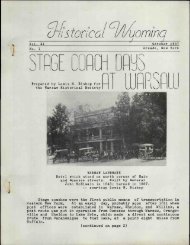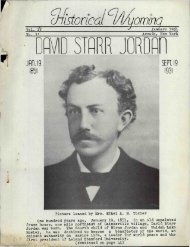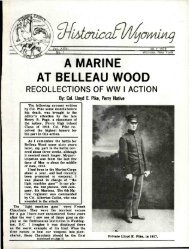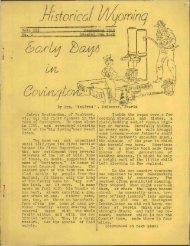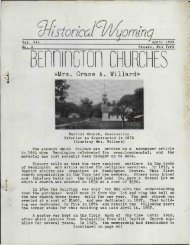Historical Wyoming County Jan 1980 - Old Fulton History
Historical Wyoming County Jan 1980 - Old Fulton History
Historical Wyoming County Jan 1980 - Old Fulton History
Create successful ePaper yourself
Turn your PDF publications into a flip-book with our unique Google optimized e-Paper software.
PAGE 58 JANUARY <strong>1980</strong><br />
<strong>Historical</strong> <strong>Wyoming</strong> is published quarterly by<br />
the <strong>Wyoming</strong> <strong>County</strong> Historian's Office, 76<br />
North Main Street, Warsaw, N.Y. 14569.<br />
Editor: John G. Wilson, <strong>County</strong> Historian;<br />
Assistant Editor, Mary Wilson. Annual subscription<br />
rate is $3.00. Subscription year<br />
runs from July 1 to July 1 and those subscribing<br />
during that period will be sent all<br />
back issues for that year. Cost for extra back<br />
issues is $1.00 per copy. Checks should be<br />
made payable to <strong>Historical</strong> <strong>Wyoming</strong> and sent<br />
to the <strong>County</strong> Historian's Office. Secondclass<br />
postage paid at Warsaw, N.Y. 14569.<br />
Postmaster send forms 3579 to <strong>County</strong> Historian's<br />
Office, 76 North Main Street, Warsaw,<br />
N.Y. 14569. USPS 104-990<br />
Mary D. Wilson<br />
A MEMORIAL<br />
As you will note on the masthead of this<br />
journal, it says, "Mary D. Wilson, Assistant<br />
Editor." That was an understatement. She was<br />
much more than that. She was the guiding<br />
light, the technical expert and the inspiration<br />
behind each issue. Since July of 1975 this<br />
little magazine has found its way into your<br />
homes because she devoted her time without<br />
recompense, save for the joy of recapturing<br />
the stories of the past. She did this because<br />
she loved people and the stories of their lives<br />
both past and present. Along with this love<br />
of humanity, she was a woman of unusually<br />
high intellect and cultural attainment. She had<br />
a B.A. degree from Barnard College and a<br />
Bachelor of Literature from Columbia University.<br />
It is not hard to understand why the<br />
<strong>Historical</strong> <strong>Wyoming</strong> has maintained such a<br />
high degree of excellence in journalism.<br />
Mary D. Wilson died unexpectedly on December<br />
13, 1979, and with her passing will<br />
go her direct influence upon this publication.<br />
We know that in her estimation it was an<br />
unfinished task and could be improved with<br />
each passing issue.<br />
We will continue the task of <strong>County</strong> Historian<br />
and Editor of <strong>Historical</strong> <strong>Wyoming</strong> praying<br />
that her inspiration and lessons, both technical<br />
and humanitarian, will remain with us and<br />
guide our efforts in the future.<br />
Beyond the Loss of Mary to the <strong>Historical</strong><br />
<strong>Wyoming</strong>, the loss is personal, one which<br />
cannot be described in words. Her family,<br />
friends and colleagues will miss her dearly.<br />
(The Warners Conl)<br />
"crookers", all seeking wealth in the new<br />
country.<br />
Arriving at the chosen spot in the forest, their<br />
first task was to erect a long home. This abode<br />
soon appeared as a rude cabin of logs piled<br />
one upon another so as to form a hallow square<br />
and the roof was covered over with the bark<br />
of trees. On the east side was an entrance; on<br />
the south, a place for a fire, and on each of<br />
the other sides were aperatures through which<br />
the light of day found the occupants. All of<br />
the country was covered with forest and nothing<br />
could be raised until the ground was cleared,<br />
which called for a great deal of labor. The<br />
first summer only a small piece was cleared<br />
too late to sow any seed but turnips, of which<br />
they had a fine crop. An older settler came<br />
with a bushel of buckwheat to exchange for<br />
some of the turnips. Milo told the man to take<br />
what he thought the wheat was worth. The man<br />
loaded his cart so heavily that it broke down.<br />
It was evident that he did not observe the<br />
Golden Rule in that exchange! During the early<br />
years cattle got their living in the woods eating<br />
the leaves and small shrubs. During the winter<br />
they fed upon the small limbs and buds from<br />
trees that had been cut down to clear the land.<br />
In the log cabin house, the back-logs used<br />
in the fireplace was too large to be put in<br />
place by hand so it was hauled into the house<br />
by oxen. The oxen were not driven into the<br />
house but there was an opening opposite the<br />
door through which the chain passed. The<br />
log was drawn close to the door, then the<br />
oxen taken to the other side of the cabin,<br />
and thus the log was drawn into the house<br />
and then rolled into the fireplace. Such a log<br />
might last a week. The fire was never allowed<br />
to go out, as it was difficult to start a new one<br />
with flint and steel, for there were no matches<br />
in those days. The coals and brands were<br />
covered with ashes to preserve the fire. Later,<br />
when there were neighbor's nearer, if the<br />
fire accidentally went out, it was common<br />
(continued on page 83)


